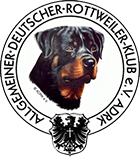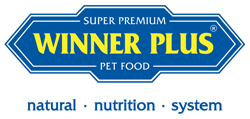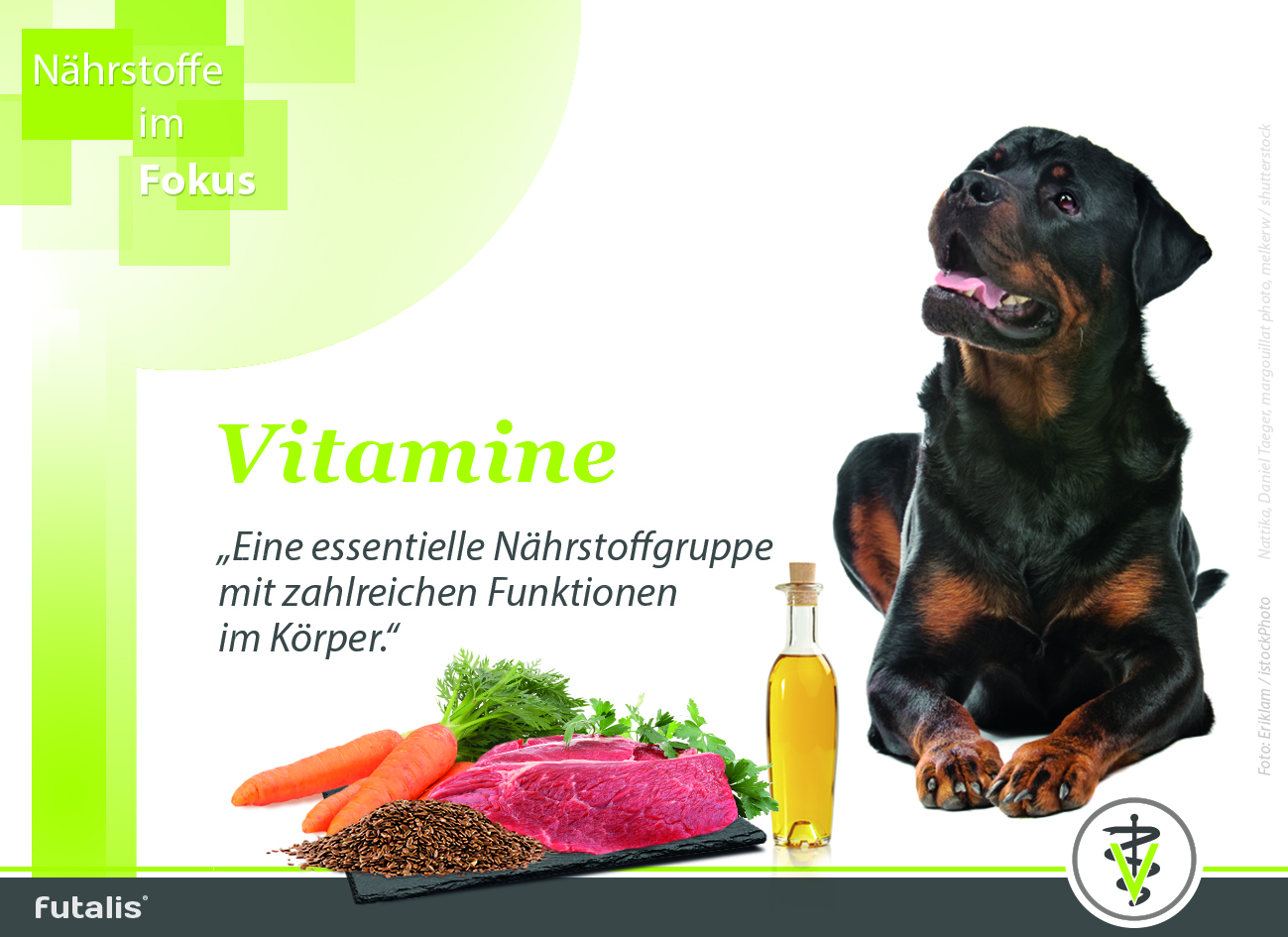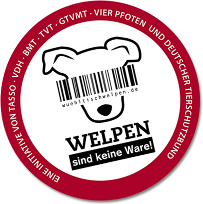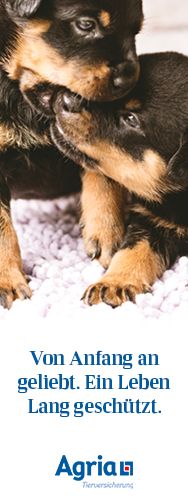| ADRK |
| Allgemeiner Deutscher Rottweiler-Klub e.V. |
Nutritients in focus: vitamins
Essential nutrients also include vitamins, which must be consumed in small amounts through food. Here you can find out why vitamins are so important.
What are vitamins?
Vitamins are not a uniform chemical group. What they do have in common, however, is that they are organic compounds that the body is generally unable to synthesize in sufficient quantities or at all. Vitamins are divided into two groups: the fat-soluble vitamins (vitamins A, D, E and K) and the water-soluble vitamins (vitamin B group and vitamin C). The fat-soluble vitamins have a certain chemical similarity, whereas the water-soluble B vitamins have clear differences in their structure.
Functions of vitamins in the body
Vitamins are required for various vital processes. Vitamin A has a protective effect on covering tissue (epithelia). This includes not only the outer skin but also, for example, the mucous membranes of the respiratory and digestive tracts. It is therefore important for the body's defense against infection, as mucous membranes dry out and lose stability if there is a vitamin A deficiency. Vitamin A also has an influence on protein synthesis and bone growth and is involved in the visual process. Vitamin D promotes the absorption of calcium and phosphorus from the intestine and contributes to the stability of the skeletal system. Vitamin E has an important function as an antioxidant both in animal feed and in the body.
Vitamin K is necessary for blood clotting, but does not usually need to be added to the diet as it can be produced in sufficient quantities by the intestinal microflora. The water-soluble vitamins essentially belong to the vitamin B group. The B vitamins are involved in most metabolic processes of a cell, so they have a far-reaching influence. In contrast to humans, vitamin C is not an essential nutrient for dogs, as it can be produced in sufficient quantities by the liver and kidneys and therefore does not need to be supplied through food.
Vitamins in the dog's diet
Unlike cats, dogs are able to synthesize vitamin A from the beta-carotene contained in some plants. Green plants and carrots contain a high amount of carotene. However, the usability of carotene is variable and depends on many factors. The most important direct source of vitamin A is liver, although the vitamin A content varies greatly depending on the animal species and its diet. Unlike humans, dogs cannot produce vitamin D even under UV radiation, which is why it must be supplied with food. Most plant-based foods are low in vitamin D, while high levels are found in some animal products such as liver or fish. Vitamin E is only contained to a small extent in animal feed. Linseed oil or cereal grains, on the other hand, are rich in vitamin E. B vitamins are generally present in sufficient quantities in most feedstuffs, but some feedstuffs have a negative effect on the utilization of B vitamins (see "Possible deficiencies and their consequences"). Vitamin B12 is a special case, as it is only found in animal products. Water-soluble vitamins cannot be stored by the body to any great extent, which is why a continuous supply via feeding is necessary.
In order to ensure a sufficient supply of vitamins and to avoid strongly fluctuating levels in natural feed, a vitaminized mineral feed adapted to the respective feed can be used. However, this should never be added to a complete feed, as this can lead to significant oversupply.
Possible misuse and its consequences
An inadequate supply of vitamin A to a pregnant bitch increases the risk of weak puppies. If a deficiency is present, growth disorders including bone changes, reduced resistance to infection and visual and auditory nerve deficits can occur within a few months during growth. These symptoms also occur in adult animals, but the deficiency must have been present for some time. A vitamin D deficiency is rare nowadays, but does occur in individual cases. Such an undersupply is reflected in poor skeletal mineralization. A suboptimal supply of vitamin E leads to very unspecific symptoms such as growth disorders and damage to skeletal muscles and the heart, which is why it is often not recognized under practical conditions. Vitamin K can usually be produced in sufficient quantities by the dog's intestinal flora. Only in rare exceptional cases, such as in the presence of severely disturbed flora or poisoning with rat poison, can a vitamin K deficiency occur. This is manifested by blood clotting disorders.
An insufficient supply of B vitamins also initially manifests itself in unspecific symptoms such as unwillingness to eat, but these are later accompanied by disorders of the central nervous system, such as cramps or paralysis. As B vitamins are contained in many feedstuffs, a deficiency is rather rare. However, a deficiency situation can arise if large quantities of raw fish are fed. Raw fish contains the enzyme thiaminase, which can break down vitamin B1 so that it can no longer be used by the body. This leads to a deficiency in the animal, even though the feed originally contained sufficient B vitamins. The situation is similar when raw eggs are given, as chicken eggs in particular contain the substance avidin, which binds biotin so that it can no longer be absorbed by the body. Both avidin and thiaminases are heat-labile and can therefore be inactivated by heating. The administration of heated eggs or heated fish is therefore harmless in this respect.
An oversupply of vitamins can also lead to health problems. Excessive administration of vitamin A leads to low weight gain, instability of the skeletal system and hyperexcitability, especially in puppies. Over-supply has been observed in particular with one-sided or frequent feeding of liver. High levels of vitamin D in the feed should be avoided as they lead to serious long-term damage. A deficient supply leads to an accumulation of calcium and phosphorus in the blood, which is associated with vascular calcification. The calcification of the kidneys that also occurs can lead to impaired kidney function and even kidney failure. Dogs show a high tolerance to an excessive intake of vitamin E, but here too it can be assumed that damage will occur in the long term. As water-soluble vitamins (apart from vitamin B12) can hardly be stored by the body, there is hardly any possibility of an overdose with normal kidney function.
The optimal supply of vitamins
The need for vitamins is not the same in all life situations. An adequate supply of vitamin A is already important during pregnancy so that the colostrum and milk are rich in vitamin A during lactation. In addition to puppies, dogs with kidney damage in particular have an increased vitamin A requirement, as increased losses occur during the course of kidney disease. The vitamin D requirement is closely linked to the calcium content in the blood, which is why it increases if insufficient calcium is given. The requirement doubles during pregnancy and lactation and is also increased during growth. If there is a kidney or bile disease, the vitamin D content of the feed should also be adjusted. As vitamin E is an antioxidant, its requirement increases when high levels of substances that oxidize easily are fed, such as essential fatty acids. The need for vitamin E is also increased during growth, pregnancy and lactation.
Damage to the kidneys can lead to massive losses of vitamin B, so the content in the feed should be increased if kidney disease is present. Due to the higher vitamin B turnover, the requirement is also increased in growing and lactating dogs, as well as in dogs that perform athletically. If the dog suffers from a malfunction of the pancreas (pancreatic insufficiency), vitamin B12 can no longer be absorbed correctly. In this case, it is possible that increased administration of the vitamin via the food is not sufficient to cover the requirement, so that an injection with a medication containing vitamin B12 may be necessary.
